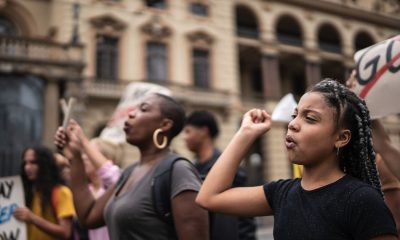Bay Area
Richmond, CA Launches First Bikeshare Program
New, robust, e-bike fleet will expand access and transportation options for residents, the underserved,
commuters, and visitors.

(Richmond, CA, June 16, 2021) – The City of Richmond, California, is teaming up with Bolt Mobility (Bolt) to launch the city’s first bikeshare program, with an all electric-assist fleet of e-bikes. Starting this week, 250 e-bikes will begin coming online, and continue over the course of the summer, integrating with and enhancing the local transportation system.
“Richmond is perhaps the best city in the Bay Area to get around on a bike. We have more San Francisco Bay Trail than any other city in the Bay Area. Our commitment to health and mobility has led to the development of the Richmond-San Rafael Bridge bicycle and pedestrian path, Richmond Greenway, Richmond Wellness Trail, Yellow Brick Road, and more,” said Richmond Mayor Tom Butt. “I look forward to residents riding Bolt’s e-bikes to the Ferry Terminal to get to San Francisco, to the Richmond Transit Center to catch a train, or to one of the many community assets that will now be just a short bike ride away.”
The e-bikes are similar to standard bicycles, but with an electric motor that provides a subtle boost, helping riders increase distances with less effort (and sweat). The e-bikes are comfortable, ergonomic, and include a spacious basket for errands and a cable lock for security. Riders can access and return the e-bikes at conveniently located transportation hubs, which are designed to prevent e-bikes from cluttering streets. Hub locations at the ferry terminal and BART stations conveniently extend the transit system from home to office, helping reduce commute times.
Payment plans are available, as are options for people who do not have access to credit or debit cards. Through sponsorship from 511 Contra Costa, the unlock fee for the pay-as-you-go plan will be waived for up to five rides to encourage new riders to try the program. In addition, the Bolt Forward program offers reduced rates to qualified individuals on government assistance. Bolt will also provide free helmets to riders, upon request. Other safety features include pedal-assisted acceleration, rather than a throttle, and a speed cap of 15 mph while on the Bay Trail.
Riders will be required to download the new “Gotcha Powered by Bolt” app, available on the Apple App Store and Google Playstore. The app is integrated with the MTC Clipper Card system, so users without a smartphone can still access the e-bikes.
“Richmond is building for the future,” said Bolt CEO Ignacio Tzoumas. “Through this partnership, we can leverage Bolt’s technology to help reduce pollution, improve congestion, provide transportation to the underserved, and shorten commute times.” The program is made possible in part by a grant from the Metropolitan Transportation Commission’s Bike Share Capital Grant program, aimed at expanding bicycle access and facilitating bicycle transportation in connection with transit. MTC manages the Clipper transit-fare payment system in partnership with Bay Area transit agencies.
About BOLT Micromobility
BOLT Mobility is a transformational personal transportation company committed to ensuring access, equity, and quality of life through micromobility. Co-founded by eight-time Olympic Gold Medalist Usain Bolt, BOLT Mobility is revolutionizing the way people move and experience their communities and travel to and from employment. Through partnerships with municipalities, universities, and local ownership, we are advancing smarter infrastructure and thoughtfully integrating sustainable and accessible transportation options into the neighborhoods we serve, helping communities thrive. Learn more at MicroMobility.com.
City of Richmond Media Contacts
Denée Evans, Project Manager
(510) 621-1718
www.ci.richmond.ca.us/4018/Bike-Share
Christopher Whitmore, Chief of Staff, Office of Mayor Tom Butt
(510) 620-6527
christopher_whitmore@ci.richmond.ca.us
Bolt Media Contact
Dan Kaplan, Laurel Strategies
202-776-7776
press@MicroMobility.com
Activism
OP-ED: AB 1349 Puts Corporate Power Over Community
Since Ticketmaster and Live Nation merged in 2010, ticket prices have jumped more than 150 percent. Activities that once fit a family’s budget now take significant disposable income that most working families simply don’t have. The problem is compounded by a system that has tilted access toward the wealthy and white-collar workers. If you have a fancy credit card, you get “presale access,” and if you work in an office instead of a warehouse, you might be able to wait in an online queue to buy a ticket. Access now means privilege.

By Bishop Joseph Simmons, Senior Pastor, Greater St. Paul Baptist Church, Oakland
As a pastor, I believe in the power that a sense of community can have on improving people’s lives. Live events are one of the few places where people from different backgrounds and ages can share the same space and experience – where construction workers sit next to lawyers at a concert, and teenagers enjoy a basketball game with their grandparents. Yet, over the past decade, I’ve witnessed these experiences – the concerts, games, and cultural events where we gather – become increasingly unaffordable, and it is a shame.
These moments of connection matter as they form part of the fabric that holds communities together. But that fabric is fraying because of Ticketmaster/Live Nation’s unchecked control over access to live events. Unfortunately, AB 1349 would only further entrench their corporate power over our spaces.
Since Ticketmaster and Live Nation merged in 2010, ticket prices have jumped more than 150 percent. Activities that once fit a family’s budget now take significant disposable income that most working families simply don’t have. The problem is compounded by a system that has tilted access toward the wealthy and white-collar workers. If you have a fancy credit card, you get “presale access,” and if you work in an office instead of a warehouse, you might be able to wait in an online queue to buy a ticket. Access now means privilege.
Power over live events is concentrated in a single corporate entity, and this regime operates without transparency or accountability – much like a dictator. Ticketmaster controls 80 percent of first-sale tickets and nearly a third of resale tickets, but they still want more. More power, more control for Ticketmaster means higher prices and less access for consumers. It’s the agenda they are pushing nationally, with the help of former Trump political operatives, who are quietly trying to undo the antitrust lawsuit launched against Ticketmaster/Live Nation under President Biden’s DOJ.
That’s why I’m deeply concerned about AB 1349 in its current form. Rather than reining in Ticketmaster’s power, the bill risks strengthening it, aligning with Trump. AB 1349 gives Ticketmaster the ability to control a consumer’s ticket forever by granting Ticketmaster’s regime new powers in state law to prevent consumers from reselling or giving away their tickets. It also creates new pathways for Ticketmaster to discriminate and retaliate against consumers who choose to shop around for the best service and fees on resale platforms that aren’t yet controlled by Ticketmaster. These provisions are anti-consumer and anti-democratic.
California has an opportunity to stand with consumers, to demand transparency, and to restore genuine competition in this industry. But that requires legislation developed with input from the community and faith leaders, not proposals backed by the very company causing the harm.
Will our laws reflect fairness, inclusion, and accountability? Or will we let corporate interests tighten their grip on spaces that should belong to everyone? I, for one, support the former and encourage the California Legislature to reject AB 1349 outright or amend it to remove any provisions that expand Ticketmaster’s control. I also urge community members to contact their representatives and advocate for accessible, inclusive live events for all Californians. Let’s work together to ensure these gathering spaces remain open and welcoming to everyone, regardless of income or background.
Activism
Oakland Post: Week of December 31, 2025 – January 6, 2026
The printed Weekly Edition of the Oakland Post: Week of – December 31, 2025 – January 6, 2026

To enlarge your view of this issue, use the slider, magnifying glass icon or full page icon in the lower right corner of the browser window.
Activism
Big God Ministry Gives Away Toys in Marin City
Pastor Hall also gave a message of encouragement to the crowd, thanking Jesus for the “best year of their lives.” He asked each of the children what they wanted to be when they grow up.

By Godfrey Lee
Big God Ministries, pastored by David Hall, gave toys to the children in Marin City on Monday, Dec. 15, on the lawn near the corner of Drake Avenue and Donahue Street.
Pastor Hall also gave a message of encouragement to the crowd, thanking Jesus for the “best year of their lives.” He asked each of the children what they wanted to be when they grew up.
Around 75 parents and children were there to receive the presents, which consisted mainly of Gideon Bibles, Cat in the Hat pillows, Barbie dolls, Tonka trucks, and Lego building sets.
A half dozen volunteers from the Big God Ministry, including Donnie Roary, helped to set up the tables for the toy giveaway. The worship music was sung by Ruby Friedman, Keri Carpenter, and Jake Monaghan, who also played the accordion.
Big God Ministries meets on Sundays at 10 a.m. at the Mill Valley Community Center, 180 Camino Alto, Mill Valley, CA Their phone number is (415) 797-2567.
-

 Activism4 weeks ago
Activism4 weeks agoDesmond Gumbs — Visionary Founder, Mentor, and Builder of Opportunity
-

 Activism4 weeks ago
Activism4 weeks agoFamilies Across the U.S. Are Facing an ‘Affordability Crisis,’ Says United Way Bay Area
-

 Alameda County4 weeks ago
Alameda County4 weeks agoOakland Council Expands Citywide Security Cameras Despite Major Opposition
-

 Alameda County4 weeks ago
Alameda County4 weeks agoBling It On: Holiday Lights Brighten Dark Nights All Around the Bay
-

 Activism4 weeks ago
Activism4 weeks agoBlack Arts Movement Business District Named New Cultural District in California
-

 Activism4 weeks ago
Activism4 weeks agoLu Lu’s House is Not Just Toying Around with the Community
-

 Activism4 weeks ago
Activism4 weeks agoOakland Post: Week of December 17 – 23, 2025
-

 Black History3 weeks ago
Black History3 weeks agoAlfred Cralle: Inventor of the Ice Cream Scoop






















































